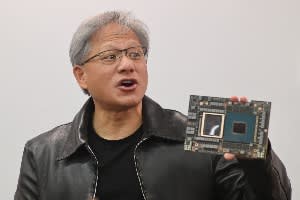SoftBank’s $50bn flotation of Arm is more than five times oversubscribed, according to bankers pitching investors on the biggest initial public offering in nearly two years, as the UK-based chip designer forecast accelerating revenue growth boosted by the artificial intelligence boom.
Despite investor concerns about a drop in profits in Arm’s most recent quarter amid a smartphone industry slowdown and the company’s exposure to multiple risks in China, advisers working on the Nasdaq listing said there was “little price sensitivity among investors”, many of whom would be forced to buy because of Arm’s inclusion in indices.
Brokers from the 28-strong army of banks selling Arm’s IPO gathered more than 100 of the world’s biggest fund managers at a New York hotel this week to convince them that this was their chance to be big winners in AI.
“AI is going to be everywhere and it all runs on Arm,” Rene Haas, the SoftBank-owned chip designer’s chief executive, told prospective investors in a pitch video seen by the Financial Times.
Arm executives projected revenue growth would accelerate after a flat year in 2023, as it increased the royalties it is paid by smartphone makers, said people who attended the roadshow. Arm indicated it could achieve revenue growth of at least 20 per cent in the financial year ending March 2025, ahead of analysts’ expectations, these people said.
“You expect the numbers to be presented in the rosiest terms, and so they were,” said one fund manager.

Earlier this week, Arm set an initial price range of $47-$51 per share, raising up to $4.9bn for its parent SoftBank and valuing the Cambridge-based company at up to $52bn.
Masayoshi Son, SoftBank’s founder, paid $32bn to buy Arm in 2016. According to people familiar with his thinking, Arm’s valuation when it starts trading in New York next week may be less important than the listing itself.
Limiting the initial listing to the sale of a small stake is not uncommon in tech IPOs. But analysts say SoftBank’s plan to hold on to most of its shares in Arm and use them to borrow money could restrict the supply over the longer term to increase its value.
Arm’s core market of smartphone chips has stagnated this year but it is hoping for growth from AI and data centre customers, despite playing only a peripheral role in the technology required to build the kinds of large language models that power ChatGPT and other generative AI systems.
In a video circulated to potential investors during the roadshow, which began on Tuesday, Haas pointed to an expected boost from the AI wave that has propelled chipmaker Nvidia to a $1.2tn valuation this year.
“Our opportunity is boundless, because everything today is a computer and with the advent of the AI era, the world’s computing needs are insatiable,” the Arm chief said as he summed up his pitch.
Jensen Huang, Nvidia’s founder and chief executive, also starred in the video. He declared Nvidia’s new Grace Hopper AI “super chip” would “not be possible if not for the nature of the Arm architecture, the incredible performance of the Arm CPU and the IP business model”.

However, some fund managers on the receiving end of the Arm charm offensive said the sheer number of bankers involved in the IPO was itself a red flag.
“The fact that everyone is coming to us with their Arm pitch feels like something that happens at the end of a cycle when it is difficult to sell a story,” said an asset manager at one global technology fund. “It’s not good optics if this is supposed to be the start of the AI cycle.”
A few weeks ago, bankers were privately pushing the idea that SoftBank would be selling 10 per cent of Arm at a level which valued the whole company at as much as $70bn. Some analysts countered it was hard to argue Arm was worth more than $40bn.
Then last month, in a surprise deal, SoftBank bought a 25 per cent stake in Arm from its own Vision Fund in a transaction which valued Arm at $64bn.
David Gibson, at MST Financial, said the huge platoon of bankers on the IPO “have done a good job in stating the high $60bn-$70bn valuation initially and then reducing it now to $50bn or so, and hence creating the perception the IPO has value and investors should participate.”
One person involved in the preparations for the IPO said Son was keen to push ahead with the listing but he also had an equally strong interest in making sure his exposure to Arm was not reduced.
As well as retaining more than 90 per cent of a company that Son believes will underpin the future of computing, SoftBank will also be able to lean on the newly listed company as a major source of financing.
In its recent “defensive” mode, SoftBank sold down its stake in the Chinese ecommerce giant Alibaba — the company in which Son was a ground-floor investor and whose expansion from minnow to whale has fuelled his reputation as a tech visionary.
In the eyes of many SoftBank shareholders, the company was able to use Alibaba shares and its ability to borrow against them, as a readily available ATM.
“SoftBank has been wanting to monetise Arm for years,” said Kirk Boodry, an analyst at Astris Advisory. “Arm is a quality asset, with punchy revenues and good margins. They can hold on to and still have the cash to use in other areas — in that respect it’s a perfect replacement for Alibaba.”
Additional reporting by Kana Inagaki in Tokyo, Nicholas Megaw, Eric Platt and Madison Darbyshire in New York, Harriet Agnew in London and Richard Waters in San Francisco
